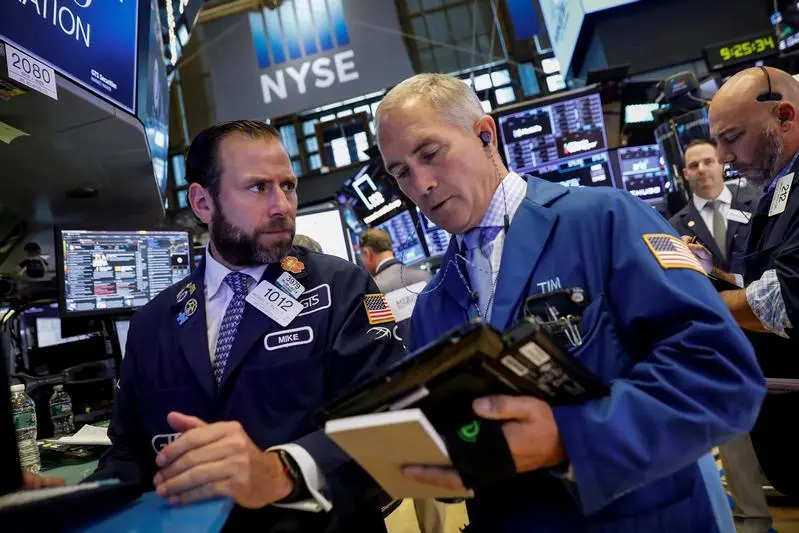PHOTO
- Oil prices rise on lower supply
- Asian shares start the week in red on trade tensions
- Most markets in the Middle East add gains on Sunday
- The dollar steadies, gold prices retreat
Oil prices
Oil prices surged in early trading on Monday on tightening global supply.
Energy services firm Baker Hughes said on Friday that United States energy companies cut two oil rigs last week, bringing the total count to 860.
The market also was pricing in new U.S. sanctions on Iran starting November, which also pushed prices.
U.S. West Texas Intermediate (WTI) crude futures were at $67.96 per barrel at 0150 GMT, up 21 cents, or 0.3 percent, from their last settlement.
Brent crude futures climbed 30 cents, or 0.4 percent, to $77.13 a barrel.
“Investors have largely turned positive again... likely welcoming the return of backwardation,” Edward Bell, commodity analyst at Emirates NBD bank, told Reuters.
Global markets
Asian shares retreated again on Monday for the eighth straight session as trade tensions between the U.S. and China weighed on equities after American President Donald Trump on Friday threathened tariffs on a further $267 billion worth of Chinese imports.
MSCI’s broadest index of Asia-Pacific shares outside Japan was last down 0.7 percent, piling on losses from last week when it dropped 3.5 percent for its worst weekly showing since mid-March.
On Friday on Wall Street, the Dow Jones Industrial Average fell 79.33 points, or 0.31 percent, to 25,916.54, the S&P 500 lost 6.37 points, or 0.22 percent, to 2,871.68, and the Nasdaq Composite was down 5.3 points or 0.07 percent at 7917.25.
“The overall sense is that the United States will continue to escalate the pressure until China submits to U.S. demands which does not seem likely any time soon,” JPMorgan said in a note, according to a Reuters report.
“Overall, the impact of tariffs and high levels of uncertainty will both continue to weigh on markets into the end of the year.”
Middle East markets
Most stock markets in the Middle East added gains on Sunday bouncing back from losses earlier in the day.
Saudi Arabia’s index added 0.54 percent after dropping 3.3 percent last week.
Dar Al Arkan Real Estate Development was the most traded stock and gained 0.3 percent, followed by Alinma Bank, up 0.6 percent, while Saudi Basic Industries Corporation (SABIC) climbed 1.7 percent.
Dubai’s index added 0.6 percent as Islamic Arab Insurance added 4.4 percent.
Neighbouring Abu Dhabi’s index closed flat on Sunday. Abu Dhabi National Energy Co (TAQA) jumped 6.2 percent, followed by another blue-chip, Aldar Properties, which gained 2.6 percent.
Qatar’s index dropped 0.6 percent, Kuwait’s index added 0.4 percent, Egypt’s index dropped 0.4 percent while Bahrain’s index added 0.3 percent and Oman’s index gained 0.5 percent.
Currencies
The dollar was steady against a basket of six major currencies on Monday.
U.S. job growth accelerated in August and wages notched their largest annual increase in more than nine years, U.S. data showed.
The dollar index, which measures the greenback against a basket of six currencies, was basically flat at 95.381, not far off a three-week high of 95.737 hit on Tuesday last week.
Precious metals
Gold prices edged down in early trading on Monday as a stronger dollar weighed on the safe haven.
Spot gold was down 0.1 percent at $1,194.61 at 0225 GMT, having fallen 0.4 percent in the previous session.
U.S. gold futures were almost flat at $1,200.30 an ounce.
(Writing by Gerard Aoun; Editing by Shane McGinley)
(gerard.aoun@thomsonreuters.com)
Gain a deeper understanding of financial markets through Thomson Reuters Eikon. Our Standards: The Thomson Reuters Trust Principles
Disclaimer: This article is provided for informational purposes only. The content does not provide tax, legal or investment advice or opinion regarding the suitability, value or profitability of any particular security, portfolio or investment strategy. Read our full disclaimer policy here.
© ZAWYA 2018





















